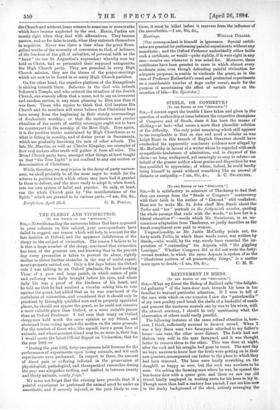THE CLERGY AND VIVISECTION.
[TO THE EDITOR OP THE SPECTATOR."] SIR,—Notwithstanding the numerous letters that have appeared in your columns on this subject, your correspondents have failed to suggest one reason which will help to account for the late decision at Oxford, and the apparent indifference of the clergy to the subject of vivisection. The reason I believe to be is that a large number of the clergy, convinced that vivisection has been of the greatest use, and knowing that in the present day every precaution is taken to prevent its abuse, rightly decline to throw further obstacles in the way of useful experi- ments properly carried out. Only a few days before the Oxford vote I was talking to an Oxford graduate, the hard-working Vicar of a poor and large parish, in which scenes of pain and suffering were daily brought before his eyes, and whose daily life was a proof of the kindness of his heart, and he told me that he had received a circular asking him to vote against the grant, but added that as be was convinced of the usefulness of vivisection, and considered that it should only be practised by throughly qualified men and in properly appointed places, he should not oppose the grant, as he could not conceive a more suitable place than Oxford, or a more suitable person than an Oxford Professor. I feel sure that many an Oxford clergyman held much the same opinion as my friend, and abstained from voting against the motion on the same grounds. For the comfort of those who, like myself, have a great love of animals, and whose greatest friend may be, as mine is, their dog, I would quote the latest Official Report on Vivisection, that for the year 1882 :- "Daring the year 1882, forty-two persons held licences for the performance of experiments upon living animals, and 406 such experiments were performed. In respect to these, the amount of direct pain or suffering inflicted in the prosecution of physiological, pathological, and therapeutical researches during the year was altogether trifling, and limited to between twenty and thirty animals, mostly frogs."
We must not forget that the existing laws provide that if a painful experiment be performed the animal must be under an anmsthetic, and if severely injured, or the pain likely to con- tine, it must be killed before it recovers from the influence of the anmsthethic.—I am, Sir, &c., [Our correspondent is himself in ignorance. Special certifi- cates are granted for performing painful experiments without any anaesthetic; and the Oxford Professor undoubtedly either holds such a certificate, or would—quite rightly, if it were right in any case—receive one whenever it was asked for. Moreover, these- certificates have been granted in cases in which almost every moderate man, even though defending painful vivisection for adequate purposes, is unable to vindicate the grant, as in the- case of Professor Rutherford's cruel and protracted experiments on a considerable number of dogs under curari, made for the: purpose of ascertaining the effect of certain drugs on the- secretion of bile.—ED. Spectator.]


































 Previous page
Previous page